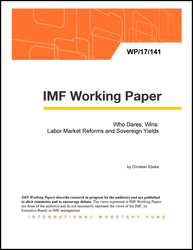
Who Dares, Wins
Labor Market Reforms and Sovereign Yields
The paper shows that investors value the adoption of structural reforms by lending at lower cost. The reform-induced reduction of long-term yields is bigger when reforms are initiated in good times and in countries facing high borrowing costs. Importantly, there is no statistical evidence that markets systematically punish countries that launch reforms concomitantly with fiscal stimulus. The paper also finds that the social context matters: structural reforms lead to a short-lived overshooting of yields when followed by strikes or lockouts. Controlling for endogeneity issues does not reject the central finding of the paper. These results are economically plausible and confirmed even after using sovereign credit ratings as an alternative dependent variable. These results have two main implications: (i) on average, labor market reforms lower borrowing costs; and (ii) country-specific circumstances also play a role.
Publication date: June 2017
ISBN: 9781475595857
$18.00
Add to Cart by clicking price of the language and format you'd like to purchase
Available Languages and Formats
| English |
Prices in red indicate formats that are not yet available but are forthcoming.
Topics covered in this book
This title contains information about the following subjects.
Click on a subject if you would like to see other titles with the same subjects.
Long-term bond yields , Structural reforms , Institutions , Long-term bond yields , Structural reforms , Institutions , Financial Markets and the Macroeconomy , General
Summary
Copyright © 2010 - 2024
Powered by:
AIDC



